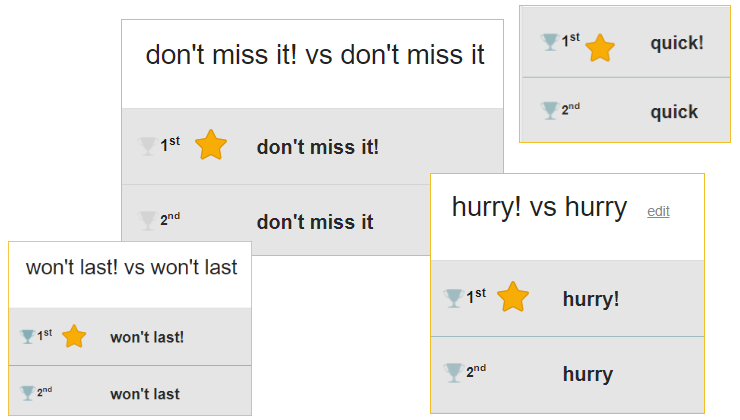When you write for conversions, the right phrasing makes all the difference in getting the reader to take action. But knowing exactly what makes them call, click, buy, visit or read can be one of the hardest parts of writing.
A few years back, we mined millions of ads and sorted high-performers from also-rans that advertisers dropped after a short time. Working with millions upon millions of ads led us to spot how certain words win over others time and time again. With those insights, we were able to compare patterns in the ads to learn which words and choices are connected to stronger conversions.
We found some eye-opening lessons, especially when it comes to building urgency. And since that's a core practice in writing good ad copy, we're passing along these valuable takeaways.
This first one wowed the audience when we first revealed it in a marketing presentation.
Curb Your Enthusiasm: Exclamations Aren’t Always Amazing.
Hold on to your hats, guys. Punctuation doesn’t always steal the headlines, but this changes everything. Exclamation points can kill your conversions.
That line itself deserves one of these = ! We learned that these marketing darlings are right at home in some messages, but sometimes they backfire.
When it comes to conversions, there are distinct rules of thumb for when to use exclamation points or drop them from your call to action.
Considering it’s the wild punctuation child, it actually follows the rules pretty well. Stray from the rule, and the exclamation point can actually tank your message.
No matter how exciting your special offer is, tacking an exclamation point onto it is a conversion killer. Boom.
It's understandable why exclamation points are seen everywhere in marketing messages and ads: We're offering fantastic products and services with incredible prices, and shoppers need to be as excited as we are. And these are offers so good, you can’t let the outside miss just how big a deal it is. Plus, who wants to hear from a boring message?
The thing is, our messages break out of being boring when the meaning entices the customer. Getting things free or beating out other shoppers can be a big win in itself.
Consider this example:
Free shipping!
That’s a big deal, right? Probably. It’s just that while the message might be strong, it is far more likely to entice the audience when it is missing the exclamation point.
Free shipping
We compared both phrases in our data, and “free shipping” comes out as the winner over its “free shipping!” counterpart. Not only is this a productive takeaway for anyone writing ads, it’s also pretty sweet that the overall lesson is, “Hey, be cool.”
Free shipping>Free shipping!
That being said, let the parade of nerdery begin. Here are the details, direct from our experiment. To start, we looked at 5,804,626 ads by 68,351 different advertisers containing the phrase “free shipping” or “free shipping!”
Let that sink in for a moment of how many ads contributed to this test. More than 5.8 million ads that promoted free shipping drove the details of this test, so our sample size and results give us high confidence that this isn’t just a “maybe” or it wouldn’t apply to you. Don’t forget that with nearly 70 thousand advertisers, that cuts across industries and audiences into territory we can easily call “mainstream.”
Across all of these instances, the phrase “free shipping” appeared 1.8 times more often in successful ads than unsuccessful ads.
Don’t despair. It’s not time to ditch the punctuation mark altogether. There’s still a place for exclamation points when used with discretion. In fact, we found a distinct rule of thumb.
- When you have an exciting offer, leave the exclamation point out.
- When you have a sense of urgency, leave it in.
Here’s the non-exclamation point muscle we see with “Special offers:”

It proves pretty strong when you’re sweetening the deal. See how the straight-forward approach continues to win out.

Now switch to rule #2. Look at the winning streak that the exclamation point gets with “Urgency” related words:

Advertisers have offers that are so compelling, they can't imagine not feeling a wave of excitement about it. But don’t worry about trying to convince your audience. They get the message best when you give it to them straight.
Time wins over Short-Supply in Building Urgency
Advertisers know how to harness urgency, the feeling that you’ll be missing out on the awesomeness that everyone else gets to enjoy. The golden news is, there’s a specific kind of urgency that makes people jump into action.
You’ll want to update your ad copy before it’s too late.
Oooh, see what happened there? Now it’s all scary and daunting. “Before it’s too late” is among the grand champions of urgency phrases. There is something about its warning that sounds helpful. It’s as though they are looking out for you, but no one controls when the awesomeness is over.
There’s a big detail right there.
Audiences don’t like having something dangled over their heads that they can’t control. Here’s the difference.
GOOD: “Limited supply” gives an idea that the store could be out of Super Squeezy Squid Dolls tomorrow. You never know: how many other people are shopping for one, too?
BETTER: “Limited time” gives the shopper a bit more control. She decides when to shop, even if it happens quickly. There’s a sense that other shoppers’ excitement over the same Super Squeezy Squid Dolls won’t take away from her special price.
THE BIG PICTURE: When you’re writing for urgency, time wins over scarcity.
When you have the choice, write ad messages that stress the urgency of time. However, you don't always have that choice. In the next sections, we'll cover different ways to build urgency and which ones seem to have an edge over others in high-performing ads. But first, let's break down the elements of how you can express diminishing time.
Make sure they know the clock is ticking
Alright, so we know the Rolling Stones had it right. Time is on your side. If you’re going to harness that concept to drive urgency, let’s drill into some hints that could help.
1. Short-term phrases dominate.
They show that your offer is ending quickly. Look to power performers like “by tomorrow” and “today” that beat out “this week only” and “this weekend only.”
Other gems include “act now” and “start now” that both beat out “hurry!” This might seem like a standard advertising rule of thumb that a small window of opportunity drives customers to take action. (Not too small a window, though, because “today” beats “now.”) However, there’s a twist.
2. Vagueness takes the crown.
The big winners that make audiences respond better than other phrases are:
In fact, “won’t last” outpowers the “act now” call to action, showing up 4 times more often in successful ads. These vague phrases pull a double-whammy for advertisers. They drum up urgency while leaving the idea open to interpretation. Customers put pressure on themselves to act instead of resigning themselves to the idea that they’ll miss the offer altogether.
3. Here’s another revelation. No one likes the end.
The end is near. Scary, isn't it? Conversion rules agree: it’s better to live in the present than to predict doom of the future. Well “doom” is a bit dramatic, but so is a frantic push that your special offer “ends today.”
The phrase “today” appears in overwhelmingly more successful ads than “ends today” does. If it’s an actual cutoff you’re after, try “until Monday” over “ends Monday.”
Remember that urgency rule of the exclamation point? It holds true here because these are about action and not about what you are offering.
“Today!” beats “today” as a better choice to build urgency.
“Hurry!” Beats “Hurry”
“Soon!” beats “Soon”
No matter your approach, building urgency with a short time window does wonders. We compared these three examples to other urgent phrases in past ads. All of them beat out any reference to a dwindling supply.
SCARCITY
But what if you don’t have that choice of pushing time? Sometimes you have just 50 dolls to sell.
Fair enough. A dwindling supply can definitely be your key point to build urgency. When your actual limited inventory is a factor, you can use that to create some excitement in your messaging.
In this case, you aren't working with time running out on a 3-day sale. Maybe you have only a small number of signed copies to sell, or your available slots might fill up quickly.
In this case, your urgency comes from scarcity, and once again, we found some winners that rely on being vague.
The familiar phrase “while supplies last” beats “limited supply.” That's an easy one to use. But you know what shows scarcity and performs even stronger with readers?
Limited quantities.
This drives home the idea that you will sell out of stock, and it gets people to take action. While it’s not the sexiest phrasing, “quantities” resonate with shoppers a lot more than “supplies” or “stock” do.
Conclusion
If you have the flexibility with your offer, test an ad with this phrasing. Let the customer build up the excitement in their own minds. Tease the idea that your offer won’t last, and if you must give details, keep the timing short.
Now get working on your own ad copy updates. Hurry!

